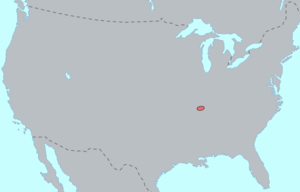Ofo language
| Ofo | |
|---|---|
| Native to | United States |
| Region | Mississippi |
| Extinct | 1997 (last speaker was Thomas Darko)[1] |
|
Siouan
| |
| Language codes | |
| ISO 639-3 | ofo |
 | |
The Ofo language was a language spoken by the Mosopelea tribe who lived until c. 1673 in what is now Ohio along the Ohio River, at which time they moved down the Mississippi River to Mississippi, near the Natchez, and thence to Louisiana, near the Tunica.
It was sometimes suspected that the Ofo language was Muskogean. But in 1908, anthropologist John R. Swanton discovered an aged female speaker living among the Tunica who had spoken Ofo since childhood. He obtained a vocabulary of the language, and quickly established that it was in fact Siouan, and similar to Biloxi.
Phonology[2]
Consonants
The following table lists the consonants of Ofo in IPA notation:
Labial Dental Palatal Velar Glottal Plosive plain [p], [b] [t], [b] [č] [k] aspirated [pʰ] [tʰ] [čʰ] [kʰ] Fricative plain [f] [s] [š] [x] [h] aspirated [fʰ] [sʰ] Sonorant [w] [l] [y] Nasal [m] [n]
Vowels
| Front | Central | Back | |
|---|---|---|---|
| High | i | u | |
| Mid | e | ə | o |
| Low | a |
Ofo also has the nasal vowels: high, front: [ĩ] high, back: [ã] low, central: [ũ]
All vowels may carry an accent.
Morphology[3]
Ofo is considered to be a mildly polysynthetic language.
Possession
Ofo distinguishes between alienable and inalienable possession through the use of a prefix for 1st, 2nd, and 3rd person singular and 1st person dual (abbreviated as 1sg, 2sg, 3sg and 1du respectively). The alienable possessions include the following: 1sg {ba-, aba-}, 2sg {č-, ača-}, 3sg {}, 1du {ã-}. The inalienable possessions include the following: 1sg {mi-}, 2sg {čĩ-}, 3sg {ĩ-}, 1du {ã-}.
Negation
Ofo uses the enclitic affix, -ni, to demonstrate negation. This enclitic is usually added after the predicate.
Instrumental Prefixes
Instrumental prefixes describe the manner in which an action is carried out. Some of the instrumental prefixes in Ofo include:
- atə- 'by extreme temperature'
- tu-, du- 'by pulling/hand'
- ta- 'by mouth'
- pa- 'by pushing'
- la- 'by foot'
- ka- 'by striking'
- pú- 'by pressure'
- po- 'by blowing/shooting'
Sources
- Holmer, Nils, M., An Ofo Phonetic Law, International Journal of American Linguistics, 13:1, 1947.
- Moseley, Christopher and R. E. Asher, ed. Atlas of the Worlds Languages (New York:Routelege, 1994) Map 5
- Dorsey, J. Owen, and John R. Swanton. 1912. "A Dictionary of the Biloxi and Ofo Languages". Bureau of American
Ethnology Bulletin 47. Washington, D. C.: Government Printing Office.
- Swanton, John R. c.1908 [Ofo-English dictionary], Typed and Autographed Document, 613 cards. National
Anthropological Archives, 2455-OFO, Smithsonian Institution, Washington, DC.
- Swanton, John R. 1909. A New Siouan Dialect. "Putnam Anniversary Volume: Anthropological Essays Presented to
Prederic Ward Putnam in Honor of His Seventieth Birthday", pp. 477-86. New York: G. E. Stechert.
References
- ↑ http://books.google.co.in/books?id=uz1OmxuNmncC&pg=PA113
- ↑ Rankin, Robert. "The Ofo Language of Louisiana: Philological Recovery of Grammar and Typology". LAVIS III: Language Variety in the South: Historical and Contemporary Perspectives. University of Alabama, 2004. PDF file.
- ↑ Rankin, Robert. "The Ofo Language of Louisiana: Philological Recovery of Grammar and Typology". LAVIS III: Language Variety in the South: Historical and Contemporary Perspectives. University of Alabama, 2004. PDF file.